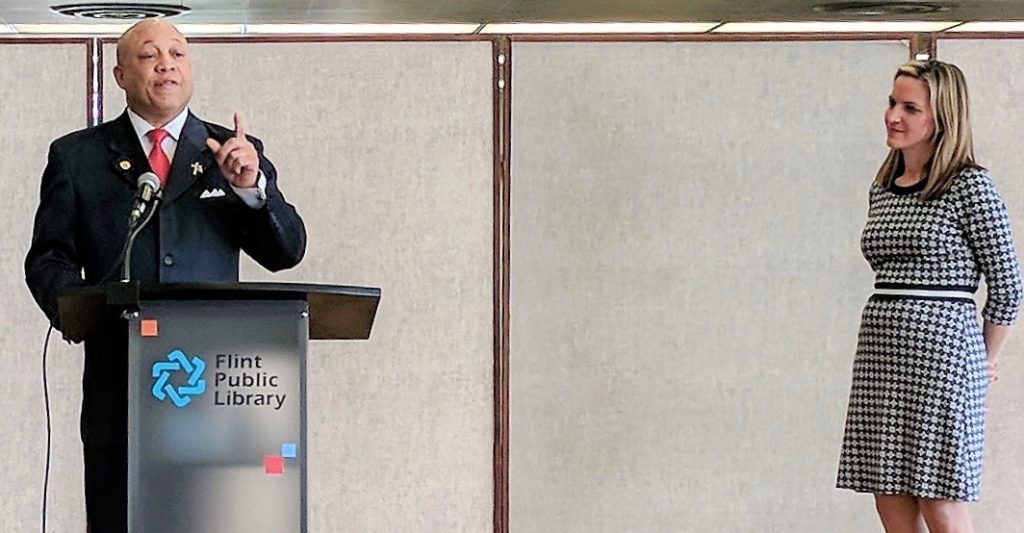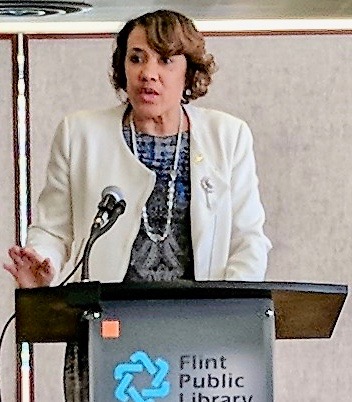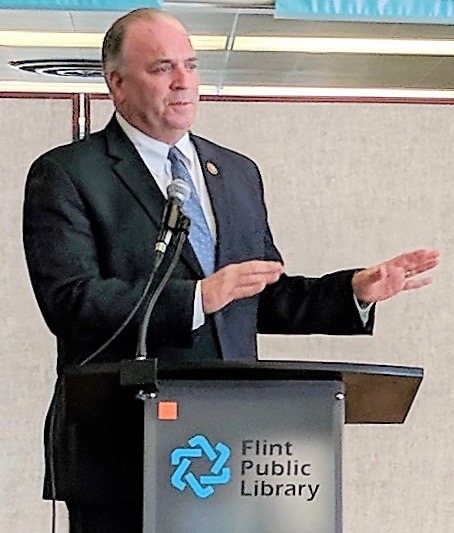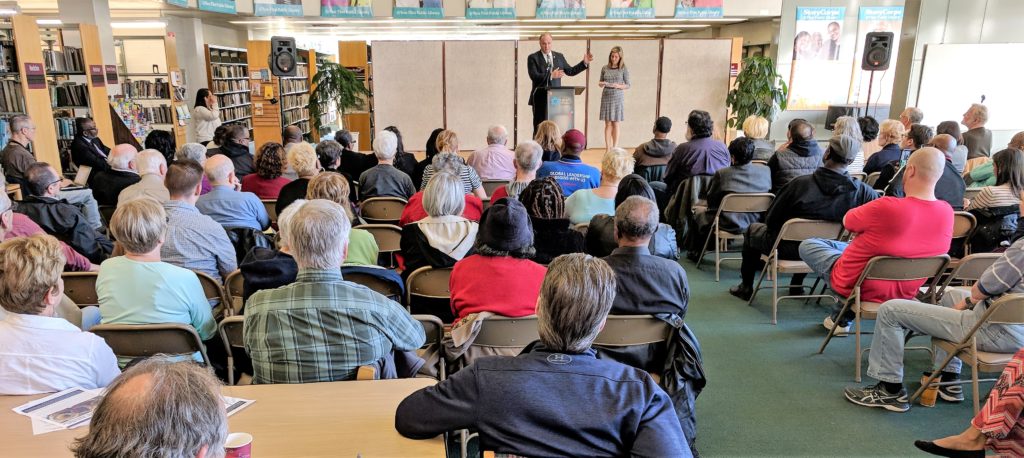By Paul Rozycki
Perhaps the most important highlight one could draw from the “Restore the Public Trust” Town Hall, held at the Flint Public Library Tuesday night, was emphasized by Michigan Secretary of State Jocelyn Benson.
Of the 100 precincts in Michigan with the lowest voter turnout, she said, 20 of them were in Flint. They averaged about 15 percent turnout.
By contrast, Benson said many precincts in Bloomfield Hills averaged an 85 percent turnout and added that its wasn’t surprising who elected officials paid attention to when there was such a difference in turnout.
Of the 100 precincts with the lowest turnout 40 were in Detroit, but Flint’s proportion of low turnout precincts is certainly greater.

Sheldon Neeley addressing the crowd (with Jocelyn Benson) at the Flint Public Library (Photo by Paul Rozycki)
Benson, Congressman Dan Kildee, Flint Mayor Karen Weaver and state Representative Sheldon Neeley were the keynote speakers at the forum, designed to encourage voters to get involved in working toward voter turn out, and to inform them of some of the measures taken to protect and expand the right to vote. They spoke to a standing room only audience of at least 150.
Benson highlighted some of the measures her office has taken to expand the right to vote. With a theme of “Restoring the Public Trust” she spoke of measures to allow for same day registration, easier absentee voting and automatic registration at the secretary of state offices.
She encouraged citizens to get involved in the newly forming redistricting commission approved by the voters last November. She promised to insure that “government would be transparent” and that Michigan had much to improve with regard to openness of government.
In response to audience questions toward the end of the program Benson emphasized the need to increase voter turnout and said that some of the precincts with the lowest turnout were in Flint and Detroit.

Mayor Karen Weaver addressing the “Restore Trust” forum (Photo by Paul Rozycki)
Flint Mayor Karen Weaver followed Benson, saying “We have a lot of work to do” and that the state needs to protect the right to vote and promote early voting.
Sheldon Neeley, chair of the Black Caucus in the state House of Representatives, also emphasized the importance of voting turnout and called the low turnout in many minority precincts a “self-inflicted wound” for black voters.
He said voting “is the greatest right we have as American citizens.” As part of his presentation he reminded those in attendance that he was offering series of voter education training sessions for those who might be intimidated by the whole voting process. Neeley also passed out pamphlets on voting rights, his training sessions, as well as copies of the U.S. Constitution.
Congressman Dan Kildee took a national view of the issue of voting and trust, and said he was concerned about the threats to democratic institutions. “Many of our foundations are being challenged.” he said, adding that he felt that there was a need to preserve democratic processes and norms, many of which had been eroded in recent years.

Kildee addressing the crowd (Photo by Paul Rozycki)
Kildee said he was particularly concerned about the rise of authoritarian leaders, both in the U.S. and abroad, about the weakening of the traditional norms of our government, and about attacks on the media. He said he felt that because of the importance of a well informed electorate the media is critical in keeping citizens involved and aware of the issues.
Turning to the Flint water crisis, Kildee said “It wasn’t about the water. It was because people were kept in the dark” and not informed of what the government was doing. Policies like the emergency manager laws denied people the right to control their own destiny. He said he felt that if the public had been involved the water crisis could have been avoided.
As a member of the U.S. House, Kildee sponsored H.R. 1, a bill which would protect and restore a range of voting rights that have been threatened. It would prevent the purging of voting rolls which has been used to deny voting rights in many states.
The same bill would also require transparency in government. It would require that candidates for the presidency and vice presidency disclose the previous ten years of taxes. Similarly the bill would require that any state receiving federal funds (he jokingly said “that’s about 50 of them”) would have to meet the same transparency requirements as members of Congress do.
“That would bring Michigan into the 21st century in terms of governmental transparency,” he said. In particular, state lawmakers would be required to disclose any conflicts of interest that they might have.
Michigan has traditionally ranked last or near last compared to other states in terms of governmental transparency. He expressed that he had “faith in the ability of citizens to advocate for themselves if well informed. If people are armed with information, our system will work.”

U.S. Congressman Dan Kildee and a standing-room-only crowd at the Flint Public Library (Photo by Paul Rozycki)
The questions from the audience touched on a variety of topics.
In response to a question on the national debt, Kildee said there were many causes including tax cuts and military spending. He said the real way to reduce the deficit was to increase growth and that sometimes those things that save a little money in the short run end up costing more in the long run. Cutting revenue sharing funds to cities may have saved a little money but caused bigger problems in the long run.
“You can’t cut your way to prosperity,” he said. adding that when it came to investment in the future, we should “allow every child to have the opportunity to go to great schools and use their talents” to the fullest, as a means of promoting economic growth.
In response to a question about the election of Donald Trump, Kildee said, “The election of this president was predictable. People feel disconnected from their government.” Yet he said he felt that few of Trump’s policies were an honest response to the lack of trust that people had in the system. Eighty-three percent of the benefit of the president’s tax bill went to the top one percent of the population, for example “It was the biggest wealth shift with the stroke of a pen in the history of our country.”
In the end, Jocelyn Benson summed up the major focus of the evening. “The path of true democracy comes through Flint,” she said. “Flint is a story for our nation when democracy fails. The state of government here and in the state will change.”
She said that greater involvement and registration can lead to a “transformative change” in our politics.
However, at the end of the presentations, the distrust in the system showed, as angry voices from neighborhood activist Tony Palladeno and others, yelled out that their questions hadn’t been answered, as the standing room only audience left the library.
EVM Staff Writer and political columnist Paul Rozycki can be reached at paul.rozycki@mcc.edu. EVM Staff Writer Harold C. Ford contributed to this report..


You must be logged in to post a comment.